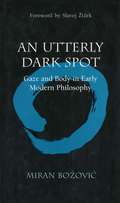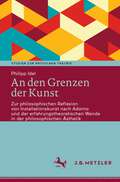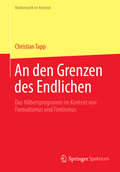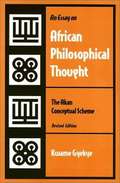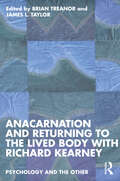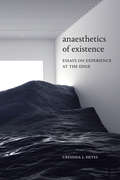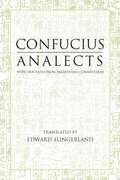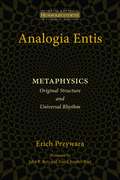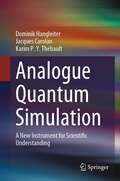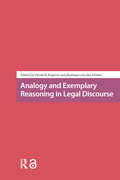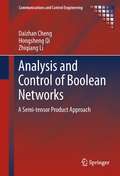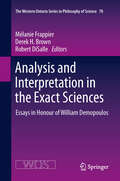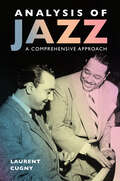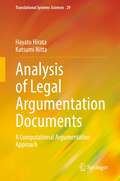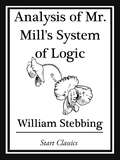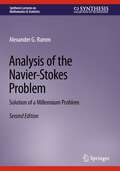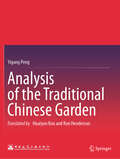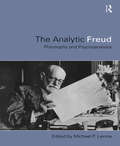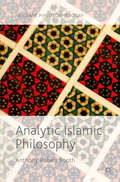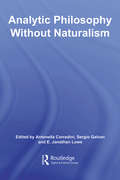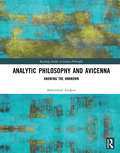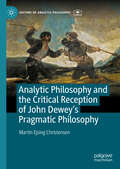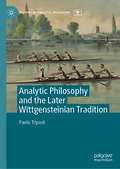- Table View
- List View
An Utterly Dark Spot
by Miran BozovicSlovenian philosopher Miran Bozovic's An Utterly Dark Spot examines the elusive status of the body in early modern European philosophy by examining its various encounters with the gaze. Its range is impressive, moving from the Greek philosophers and theorists of the body (Aristotle, Plato, Hippocratic medical writers) to early modern thinkers (Spinoza, Leibniz, Malebranche, Descartes, Bentham) to modern figures including Jon Elster, Lacan, Althusser, Alfred Hitchcock, Stephen J. Gould, and others. Bozovic provides startling glimpses into various foreign mentalities haunted by problems of divinity, immortality, creation, nature, and desire, provoking insights that invert familiar assumptions about the relationship between mind and body. The perspective is Lacanian, but Bozovic explores the idiosyncrasies of his material (e.g., the bodies of the Scythians, the transvestites transformed and disguised for the gaze of God; or Adam's body, which remained unseen as long as it was the only one in existence) with an attention to detail that is exceptional among Lacanian theorists. The approach makes for engaging reading, as Bozovic stages imagined encounters between leading thinkers, allowing them to converse about subjects that each explored, but in a different time and place. While its focus is on a particular problem in the history of philosophy, An Utterly Dark Spot will appeal to those interested in cultural studies, semiotics, theology, the history of religion, and political philosophy as well.
An den Grenzen der Kunst: Zur philosophischen Reflexion von Installationskunst nach Adorno und der erfahrungstheoretischen Wende in der philosophischen Ästhetik (Studien zur Kritischen Theorie)
by Philipp IdelInstallationskunst verschiebt die Grenzen der Künste und der Kunst, indem sie die Künste füreinander und die Kunst für die außerkünstlerische Realität sowie für die Betrachterin öffnet. Das wirft nach Ansicht vieler die Frage auf, ob Installationskunst autonom ist. Die erfahrungstheoretische Ästhetik behauptet, Installationskunst als autonome Kunst begreiflich machen zu können, wodurch diese Ästhetik sich von Theodor W. Adornos Ästhetik unterscheide. Das Buch zeigt, dass das nicht zutrifft, und wie Adornos Ästhetik zur philosophischen Reflexion von Installationskunst beitragen kann.
An den Grenzen des Endlichen: Das Hilbertprogramm im Kontext von Formalismus und Finitismus (Mathematik im Kontext)
by Christian TappDer Mathematiker David Hilbert entwickelte mit seiner Beweistheorie ein Programm zur Grundlegung der Mathematik. In der ersten deutschsprachigen Monographie zum Thema bietet der Autor neue Deutungen des Hilbertprogramms. Ausgehend von den historischen Quellen stellt er die Frage neu, ob Hilbert eine formalistische Philosophie der Mathematik voraussetzte. Er macht die Fülle der Ideen sichtbar, die Hilbert und seine Schüler formulierten, diskutiert anspruchsvolle philosophische Implikationen und räumt mit einer Reihe von Fehlinterpretationen auf.
An essay on African philosophical thought The Akan conceptual scheme (Revised edition)
by Kwame GyekyeDefining the main principles of a distinct African philosophy, this work rejects the idea that an African philosophy consists simply of the work of Africans writing on philosophy. It argues that critical analyses of specific traditional African modes of thought are necessary to develop a distinctively African philosophy.
An introduction to Confucianism
by Xinzhong YaoTaking into account the long history and wide range of Confucian Studies, this book introduces Confucianism - initiated in China by Confucius (551 BC–479 BC) - primarily as a philosophical and religious tradition. It pays attention to Confucianism in both the West and the East, focussing on the tradition's doctrines, schools, rituals, sacred places and terminology, but also stressing the adaptations, transformations and new thinking taking place in modern times. Xinzhong Yao presents Confucianism as a tradition with many dimensions and as an ancient tradition with contemporary appeal. This gives the reader a richer and clearer view of how Confucianism functioned in the past and of what it means in the present. A Chinese scholar based in the West, he draws together the many strands of Confucianism in a style accessible to students, teachers, and general readers interested in one of the world's major religious traditions.
Anacarnation and Returning to the Lived Body with Richard Kearney (Psychology and the Other)
by James L. Taylor Brian TreanorThis edited collection responds to Richard Kearney’s recent work on touch, excarnation, and embodiment, as well as his broader work in carnal hermeneutics, which sets the stage for his return to and retrieval of the senses of the lived body. Here, fourteen scholars engage the breadth and depth of Kearney’s work to illuminate our experience of the body. The chapters collected within take up a wide variety of subjects, from nature and non-human animals to our experience of the sacred and the demonic, and from art’s account of touching to the political implications of various types of embodiment. Featuring also an inspired new reflection from Kearney himself, in which he lays out his vision for “anacarnation,” this volume is an important statement about the centrality of touch and embodiment in our experience, and a reminder that, despite the excarnating tendencies of contemporary life, the lived body remains a touchstone for wisdom in our increasingly complicated and fragile world. Written for scholars and students interested in touch, embodiment, phenomenology, and hermeneutics, this diverse and challenging collection contributes to a growing field of scholarship that recognizes and attempts to correct the excarnating trends in philosophy and in culture at large.
Anaesthetics of Existence: Essays on Experience at the Edge
by Cressida J. Heyes“Experience” is a thoroughly political category, a social and historical product not authored by any individual. At the same time, “the personal is political,” and one's own lived experience is an important epistemic resource. In Anaesthetics of Existence Cressida J. Heyes reconciles these two positions, drawing on examples of things that happen to us but are nonetheless excluded from experience. If for Foucault an “aesthetics of existence” was a project of making one's life a work of art, Heyes's “anaesthetics of existence” describes antiprojects that are tacitly excluded from life—but should be brought back in. Drawing on critical phenomenology, genealogy, and feminist theory, Heyes shows how and why experience has edges, and she analyzes phenomena that press against those edges. Essays on sexual violence against unconscious victims, the temporality of drug use, and childbirth as a limit-experience build a politics of experience while showcasing Heyes's much-needed new philosophical method.
Analects: With Selections from Traditional Commentaries (Hackett Classics)
by ConfuciusThis edition goes beyond others that largely leave readers to their own devices in understanding this cryptic work, by providing an entrée into the text that parallels the traditional Chinese way of approaching it: alongside Slingerland's exquisite rendering of the work are his translations of a selection of classic Chinese commentaries that shed light on difficult passages, provide historical and cultural context, and invite the reader to ponder a range of interpretations. The ideal student edition, this volume also includes a general introduction, notes, multiple appendices--including a glossary of technical terms, references to modern Western scholarship that point the way for further study, and an annotated bibliography.
Analogia Entis: Original Structure and Universal Rhythm (Ressourcement: Retrieval and Renewal in Catholic Thought (RRRCT))
by Erich PrzywaraAlthough Erich Przywara (1889–1972) was one of the preeminent Catholic theologians of his time and a profound influence on such people as Hans Urs von Balthasar and Joseph Ratzinger, he has remained virtually unknown in North America. This volume includes Przywara’s groundbreaking Analogia Entis, originally published in 1932, and his subsequent essays on the concept analogia entis -- the analogy between God and creation -- which has currency in philosophical and theological circles today.
Analogical Investigations
by Lloyd, G. E. R.Western philosophy and science are responsible for constructing some powerful tools of investigation, aiming at discovering the truth, delivering robust explanations, verifying conjectures, showing that inferences are sound and demonstrating results conclusively. By contrast reasoning that depends on analogies has often been viewed with suspicion. Professor Lloyd first explores the origins of those Western ideals, criticises some of their excesses and redresses the balance in favour of looser, admittedly non-demonstrative analogical reasoning. For this he takes examples both from ancient Greek and Chinese thought and from the materials of recent ethnography to show how different ancient and modern cultures have developed different styles of reasoning. He also develops two original but controversial ideas, that of semantic stretch (to cast doubt on the literal/metaphorical dichotomy) and the multidimensionality of reality (to bypass the realism versus relativism and nature versus nurture controversies).
Analogue Quantum Simulation: A New Instrument for Scientific Understanding
by Dominik Hangleiter Jacques Carolan Karim P. ThébaultThis book presents fresh insights into analogue quantum simulation. It argues that these simulations are a new instrument of science. They require a bespoke philosophical analysis, sensitive to both the similarities to and the differences with conventional scientific practices such as analogical argument, experimentation, and classical simulation.The analysis situates the various forms of analogue quantum simulation on the methodological map of modern science. In doing so, it clarifies the functions that analogue quantum simulation serves in scientific practice. To this end, the authors introduce a number of important terminological distinctions. They establish that analogue quantum ‘computation' and ‘emulation' are distinct scientific practices and lead to distinct forms of scientific understanding. The authors also demonstrate the normative value of the computation vs. emulation distinction at both an epistemic and a pragmatic level.The volume features a range of detailed case studies focusing on: i) cold atom computation of many-body localisation and the Higgs mode; ii) photonic emulation of quantum effects in biological systems; and iii) emulation of Hawing radiation in dispersive optical media. Overall, readers will discover a normative framework to isolate and support the goals of scientists undertaking analogue quantum simulation and emulation. This framework will prove useful to both working scientists and philosophers of science interested in cutting-edge scientific practice.
Analogy and Exemplary Reasoning in Legal Discourse
by Hendrik Kaptein van der Velden, BastiaanThis book brings together contributions from leading figures in legal studies on analogy and related forms of reasoning in the law. Analogical reasoning-which relies on the concept of two different things being in some way like each other-is hugely important not just in the practice of law, but it is nonetheless strongly contested. This volume raises key questions like: What is the logical, argumentative, rhetorical, or just heuristic force of analogy in law? Is analogy really different from extensive interpretation, reasoning by precedent and appeal to paradigm?
Analysis and Control of Boolean Networks: A Semi-tensor Product Approach (Communications and Control Engineering)
by Hongsheng Qi Daizhan Cheng Zhiqiang LiAnalysis and Control of Boolean Networks presents a systematic new approach to the investigation of Boolean control networks. The fundamental tool in this approach is a novel matrix product called the semi-tensor product (STP). Using the STP, a logical function can be expressed as a conventional discrete-time linear system. In the light of this linear expression, certain major issues concerning Boolean network topology - fixed points, cycles, transient times and basins of attractors - can be easily revealed by a set of formulae. This framework renders the state-space approach to dynamic control systems applicable to Boolean control networks. The bilinear-systemic representation of a Boolean control network makes it possible to investigate basic control problems including controllability, observability, stabilization, disturbance decoupling etc.
Analysis and Interpretation in the Exact Sciences: Essays in Honour of William Demopoulos (The Western Ontario Series in Philosophy of Science #78)
by Robert Disalle Melanie Frappier Derek BrownThe essays in this volume concern the points of intersection between analytic philosophy and the philosophy of the exact sciences. More precisely, it concern connections between knowledge in mathematics and the exact sciences, on the one hand, and the conceptual foundations of knowledge in general. Its guiding idea is that, in contemporary philosophy of science, there are profound problems of theoretical interpretation-- problems that transcend both the methodological concerns of general philosophy of science, and the technical concerns of philosophers of particular sciences. A fruitful approach to these problems combines the study of scientific detail with the kind of conceptual analysis that is characteristic of the modern analytic tradition. Such an approach is shared by these contributors: some primarily known as analytic philosophers, some as philosophers of science, but all deeply aware that the problems of analysis and interpretation link these fields together.
Analysis of Jazz: A Comprehensive Approach (American Made Music Series)
by Laurent CugnyAnalysis of Jazz: A Comprehensive Approach, originally published in French as Analyser le jazz, is available here in English for the first time. In this groundbreaking volume, Laurent Cugny examines and connects the theoretical and methodological processes that underlie all of jazz. Jazz in all its forms has been researched and analyzed by performers, scholars, and critics, and Analysis of Jazz is required reading for any serious study of jazz; but not just musicians and musicologists analyze jazz. All listeners are analysts to some extent. Listening is an active process; it may not involve questioning but it always involves remembering, comparing, and listening again. This book is for anyone who attentively listens to and wants to understand jazz. Divided into three parts, the book focuses on the work of jazz, analytical parameters, and analysis. In part one, Cugny aims at defining what a jazz work is precisely, offering suggestions based on the main features of definition and structure. Part two he dedicates to the analytical parameters of jazz in which a work is performed: harmony, rhythm, form, sound, and melody. Part three takes up the analysis of jazz itself, its history, issues of transcription, and the nature of improvised solos. In conclusion, Cugny addresses the issues of interpretation to reflect on the goals of analysis with regard to understanding the history of jazz and the different cultural backgrounds in which it takes place. Analysis of Jazz presents a detailed inventory of theoretical tools and issues necessary for understanding jazz.
Analysis of Legal Argumentation Documents: A Computational Argumentation Approach (Translational Systems Sciences #29)
by Katsumi Nitta Hayato HirataThis book introduces methods to analyze legal documents such as negotiation records and legal precedents, using computational argumentation theory.First, a method to automatically evaluate argumentation skills from the records of argumentation exercises is proposed. In law school, argumentation exercises are often conducted and many records of them are produced. From each utterance in the record, a pattern of “speech act +factor” is extracted, and argumentation skills are evaluated from the sequences of the patterns, using a scoring prediction model constructed by multiple regression analyses between the appearance pattern and the scoring results. The usefulness of this method is shown by applying it to the example case “the garbage house problem”. Second, a method of extracting factors (elements that characterize precedents and cases) and legal topoi from individual precedents and using them as the expression of precedents to analyze how the pattern of factors and legal topoi appearing in a group of precedents affects the judgment (plaintiff wins/defendant wins) is proposed. This method has been applied to a group of tax cases. Third, the logical structure of 70 labor cases is described in detail by using factors and a bipolar argumentation framework (BAF) and an (extended argumentation framework (EAF) together. BAF describes the logical structure between plaintiff and defendant, and EAF describes the decision of the judge. Incorporating the legal topoi into the EAF of computational argumentation theory, the strength of the analysis of precedents by combined use of factored BAF and EAF, not only which argument the judge adopted could be specified. It was also possible to determine what kind of value judgment was made and to verify the logic. The analysis methods in this book demonstrate the application of logic-based AI methods to the legal domain, and they contribute to the education and training of law school students in logical ways of argumentation.
Analysis of Mr. Mill's System of Logic
by William StebbingPhilosophical text written by William Stebbing, author of "Five Centuries of English Verse" and "Sir Walter Ralegh A Biography"
Analysis of the Navier-Stokes Problem: Solution of a Millennium Problem (Synthesis Lectures on Mathematics & Statistics)
by Alexander G. RammThis book revises and expands upon the prior edition, The Navier-Stokes Problem. The focus of this book is to provide a mathematical analysis of the Navier-Stokes Problem (NSP) in R^3 without boundaries. Before delving into analysis, the author begins by explaining the background and history of the Navier-Stokes Problem. This edition includes new analysis and an a priori estimate of the solution. The estimate proves the contradictory nature of the Navier-Stokes Problem. The author reaches the conclusion that the solution to the NSP with smooth and rapidly decaying data cannot exist for all positive times. By proving the NSP paradox, this book provides a solution to the millennium problem concerning the Navier-Stokes Equations and shows that they are physically and mathematically contradictive.
Analysis of the Traditional Chinese Garden
by Yigang PengAnalysis of the Traditional Chinese Garden is a seminal resource for the spatial principles and techniques that shape traditional Chinese gardens. It is a richly illustrated resource for historians, theorists, garden designers, landscape architects, architects and anyone interested in the design of these world renowned gardens with 106 pages of hand-drawn sketches by the author that vividly portray the intricacies and subtleties of traditional Chinese gardens. The book is widely known in China as a primary text for analysis of the gardens and was recognized with the inaugural National Excellent Architectural Book Award in 1990 and, since its debut in China in 1986, has garnered immense popularity and acclaim with 50 reprints and a total print run of 150,000 copies.
Analytic Freud: Philosophy and Psychoanalysis
by Michael P. LevineThis is a timely and stimulating collection of essays on the importance of Freudian thought for analytic philosophy, investigating its impact on mind, ethics, sexuality, religion and epistemology.Marking a clear departure from the long-standing debate over whether Freudian thought is scientific or not, The Analytic Freud expands the framework of philosophical inquiry, demonstrating how fertile and mutually enriching the relationship between philosophy and psychoanalysis can be.The essays are divided into four clear sections, addressing the implications of Freud for philosophy of mind, ethics, sexuality and civilisation. The authors discuss the problems psychoanalysis poses for contemporary philosophy as well as what philosophy can learn from Freud's legacy and undeniable influence. For instance, The Analytic Freud discusses the problems presented by pyschoanalytic theories of the mind for the philosophy of language; the issues which current theories of mind and meaning raise for psychoanalytic accounts of emotion, metaphor, the will and self-deception; the question whether psychoanalytic theory is essential in understanding sexuality, love, humour and the tensions which arise out of personal relationships.The Analytic Freud is a critical and thorough examination of Freudian and post-Freudian theory, adding a welcome and significant dimension to the debate between psychoanalysis and contemporary philosophy.
Analytic Islamic Philosophy (Palgrave Philosophy Today)
by Anthony Robert BoothThis book is an introduction to Islamic Philosophy, beginning with its Medieval inception, right through to its more contemporary incarnations. Using the language and conceptual apparatus of contemporary Anglo-American ‘Analytic’ philosophy, this book represents a novel and creative attempt to rejuvenate Islamic Philosophy for a modern audience. It adopts a ‘rational reconstructive’ approach to the history of philosophy by affording maximum hermeneutical priority to the strongest possible interpretation of a philosopher’s arguments while also paying attention to the historical context in which they worked. The central canonical figures of Medieval Islamic Philosophy – al-Kindi, al-Farabi, Avicenna, al-Ghazali, Averroes – are presented chronologically along with an introduction to the central themes of Islamic theology and the Greek philosophical tradition they inherited. The book then briefly introduces what the author collectively refers to as the ‘Pre-Modern’ figures including Suhrawardi, Mulla Sadra, and Ibn Taymiyyah, and presents all of these thinkers, along with their Medieval predecessors, as forerunners to the more modern incarnation of Islamic Philosophy: Political Islam.
Analytic Philosophy Without Naturalism (Routledge Studies in Twentieth-Century Philosophy)
by Antonella Corradini Sergio Galvan E. Jonathan LoweIn recent years numerous attempts have been made by analytic philosophers to naturalize various different domains of philosophical inquiry. All of these attempts have had the common goal of rendering these areas of philosophy amenable to empirical methods, with the intention of securing for them the supposedly objective status and broad intellectual appeal currently associated with such approaches. This volume brings together internationally recognised analytic philosophers, including Alvin Plantinga, Peter van Inwagen and Robert Audi, to question the project of naturalism. The articles investigate what it means to naturalize a domain of philosophical inquiry and look at how this applies to the various sub-disciplines of philosophy including epistemology, metaphysics and the philosophy of the mind. The issue of whether naturalism is desirable is raised and the contributors take seriously the possibility that excellent analytic philosophy can be undertaken without naturalization. Controversial and thought-provoking, Analytic Philosophy Without Naturalism examines interesting and contentious methodological issues in analytic philosophy and explores the connections between philosophy and science.
Analytic Philosophy and Avicenna: Knowing the Unknown (Routledge Studies in Islamic Philosophy)
by Mohammad AzadpurThis work engages in a constructive, yet subtle, dialogue with the nuanced accounts of sensory intentionality and empirical knowledge offered by the Islamic philosopher Avicenna. This discourse has two main objectives: (1) providing an interpretation of Avicenna’s epistemology that avoids reading him as a precursor to British empiricists or as a full-fledged emanatist and (2) bringing light to the importance of Avicenna’s account of experience to relevant contemporary Anglo-American discussions in epistemology and metaphysics. These two objectives are interconnected. Anglo-American philosophy provides the framework for a novel reading of Avicenna on knowledge and reality, and the latter, in turn, contributes to adjusting some aspects of the former. Advancing the Avicennian perspective on contemporary analytic discourse, this volume is a key resource for researchers and students interested in comparative and analytic epistemology and metaphysics as well as Islamic philosophy.
Analytic Philosophy and the Critical Reception of John Dewey’s Pragmatic Philosophy (History of Analytic Philosophy)
by Martin Ejsing ChristensenThis book examines the critical reception of Dewey&’s pragmatic philosophy by six prominent analytic philosophers and relates it to the contested history of analytic philosophy and Deweyan pragmatism. It argues that analytic philosophers&’ critical reception of Dewey&’s pragmatist philosophy has, from the very beginning, been marred by externalist readings that do not engage with Dewey&’s thinking from the inside, and suggests that this throws doubt upon the new revisionary histories of analytic philosophy and Deweyan pragmatism according to which the marginalization of Dewey&’s pragmatism represents the sensible result of critical processes of reasoning. At the same time, however, the book also points out that Dewey and his analytic critics in fact share several worries and suggests that these common concerns might serve as points of reference for more fruitful dialogues across the traditions of analytic philosophy and Deweyan pragmatism in the future.
Analytic Philosophy and the Later Wittgensteinian Tradition (History of Analytic Philosophy)
by Paolo TripodiThis book aims to explain the decline of the later Wittgensteinian tradition in analytic philosophy during the second half of the twentieth century. Throughout the 1950s, Oxford was the center of analytic philosophy and Wittgenstein – the later Wittgenstein – the most influential contemporary thinker within that philosophical tradition. Wittgenstein's methods and ideas were widely accepted, with everything seeming to point to the Wittgensteinian paradigm having a similar impact on the philosophical scenes of all English speaking countries. However, this was not to be the case. By the 1980s, albeit still important, Wittgenstein was considered as a somewhat marginal thinker. What occurred within the history of analytic philosophy to produce such a decline? This book expertly traces the early reception of Wittgenstein in the United States, the shift in the humanities to a tradition rooted in the natural sciences, and the economic crisis of the mid-1970s, to reveal the factors that contributed to the eventual hostility towards the later Wittgensteinian tradition.
